Analyzing Fetal Abnormality Case Study: Ethical Frameworks
VerifiedAdded on 2023/06/04
|5
|1135
|156
Case Study
AI Summary
This case study examines the ethical and moral dilemmas surrounding a fetal abnormality diagnosis for Mexican migrants Jessica and Marco. The analysis delves into the application of pro-abortion, pro-life, and pro-choice theories, as well as the cognitive properties theory, to understand the perspectives of Dr. Wilson, Maria, Marco, and Jessica, respectively. The study explores how these theories influence recommendations for action, particularly regarding the decision to continue or terminate the pregnancy. From a personal standpoint, the author aligns with the pro-life theory, emphasizing the sanctity of life and the belief that all human beings are created in God's image. The conclusion highlights the psychological complications arising from the diagnosis and the ethical debate surrounding unplanned pregnancies with developmental deficits. Desklib provides a platform for students to access similar case studies and solved assignments.
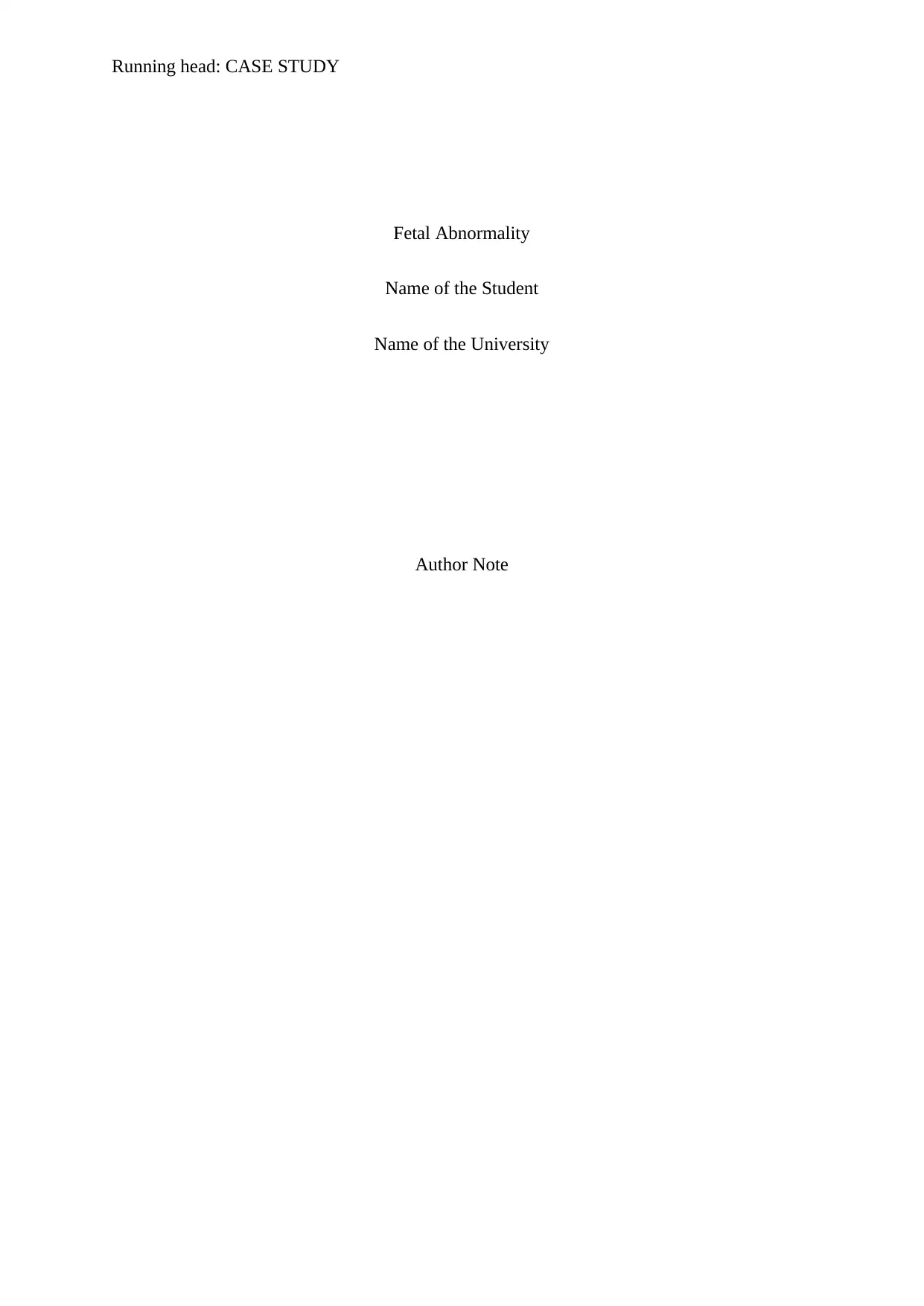
Running head: CASE STUDY
Fetal Abnormality
Name of the Student
Name of the University
Author Note
Fetal Abnormality
Name of the Student
Name of the University
Author Note
Paraphrase This Document
Need a fresh take? Get an instant paraphrase of this document with our AI Paraphraser
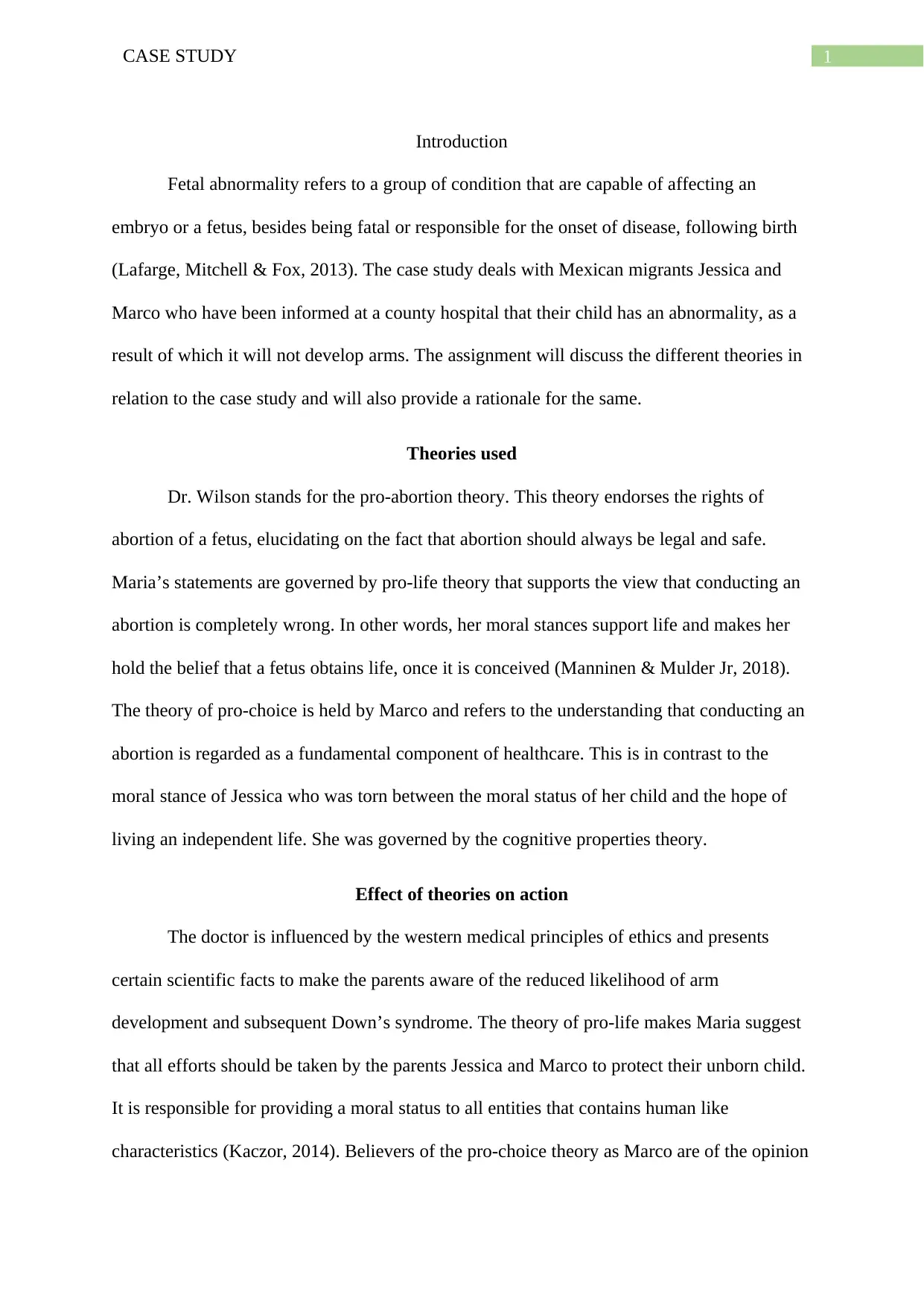
1CASE STUDY
Introduction
Fetal abnormality refers to a group of condition that are capable of affecting an
embryo or a fetus, besides being fatal or responsible for the onset of disease, following birth
(Lafarge, Mitchell & Fox, 2013). The case study deals with Mexican migrants Jessica and
Marco who have been informed at a county hospital that their child has an abnormality, as a
result of which it will not develop arms. The assignment will discuss the different theories in
relation to the case study and will also provide a rationale for the same.
Theories used
Dr. Wilson stands for the pro-abortion theory. This theory endorses the rights of
abortion of a fetus, elucidating on the fact that abortion should always be legal and safe.
Maria’s statements are governed by pro-life theory that supports the view that conducting an
abortion is completely wrong. In other words, her moral stances support life and makes her
hold the belief that a fetus obtains life, once it is conceived (Manninen & Mulder Jr, 2018).
The theory of pro-choice is held by Marco and refers to the understanding that conducting an
abortion is regarded as a fundamental component of healthcare. This is in contrast to the
moral stance of Jessica who was torn between the moral status of her child and the hope of
living an independent life. She was governed by the cognitive properties theory.
Effect of theories on action
The doctor is influenced by the western medical principles of ethics and presents
certain scientific facts to make the parents aware of the reduced likelihood of arm
development and subsequent Down’s syndrome. The theory of pro-life makes Maria suggest
that all efforts should be taken by the parents Jessica and Marco to protect their unborn child.
It is responsible for providing a moral status to all entities that contains human like
characteristics (Kaczor, 2014). Believers of the pro-choice theory as Marco are of the opinion
Introduction
Fetal abnormality refers to a group of condition that are capable of affecting an
embryo or a fetus, besides being fatal or responsible for the onset of disease, following birth
(Lafarge, Mitchell & Fox, 2013). The case study deals with Mexican migrants Jessica and
Marco who have been informed at a county hospital that their child has an abnormality, as a
result of which it will not develop arms. The assignment will discuss the different theories in
relation to the case study and will also provide a rationale for the same.
Theories used
Dr. Wilson stands for the pro-abortion theory. This theory endorses the rights of
abortion of a fetus, elucidating on the fact that abortion should always be legal and safe.
Maria’s statements are governed by pro-life theory that supports the view that conducting an
abortion is completely wrong. In other words, her moral stances support life and makes her
hold the belief that a fetus obtains life, once it is conceived (Manninen & Mulder Jr, 2018).
The theory of pro-choice is held by Marco and refers to the understanding that conducting an
abortion is regarded as a fundamental component of healthcare. This is in contrast to the
moral stance of Jessica who was torn between the moral status of her child and the hope of
living an independent life. She was governed by the cognitive properties theory.
Effect of theories on action
The doctor is influenced by the western medical principles of ethics and presents
certain scientific facts to make the parents aware of the reduced likelihood of arm
development and subsequent Down’s syndrome. The theory of pro-life makes Maria suggest
that all efforts should be taken by the parents Jessica and Marco to protect their unborn child.
It is responsible for providing a moral status to all entities that contains human like
characteristics (Kaczor, 2014). Believers of the pro-choice theory as Marco are of the opinion
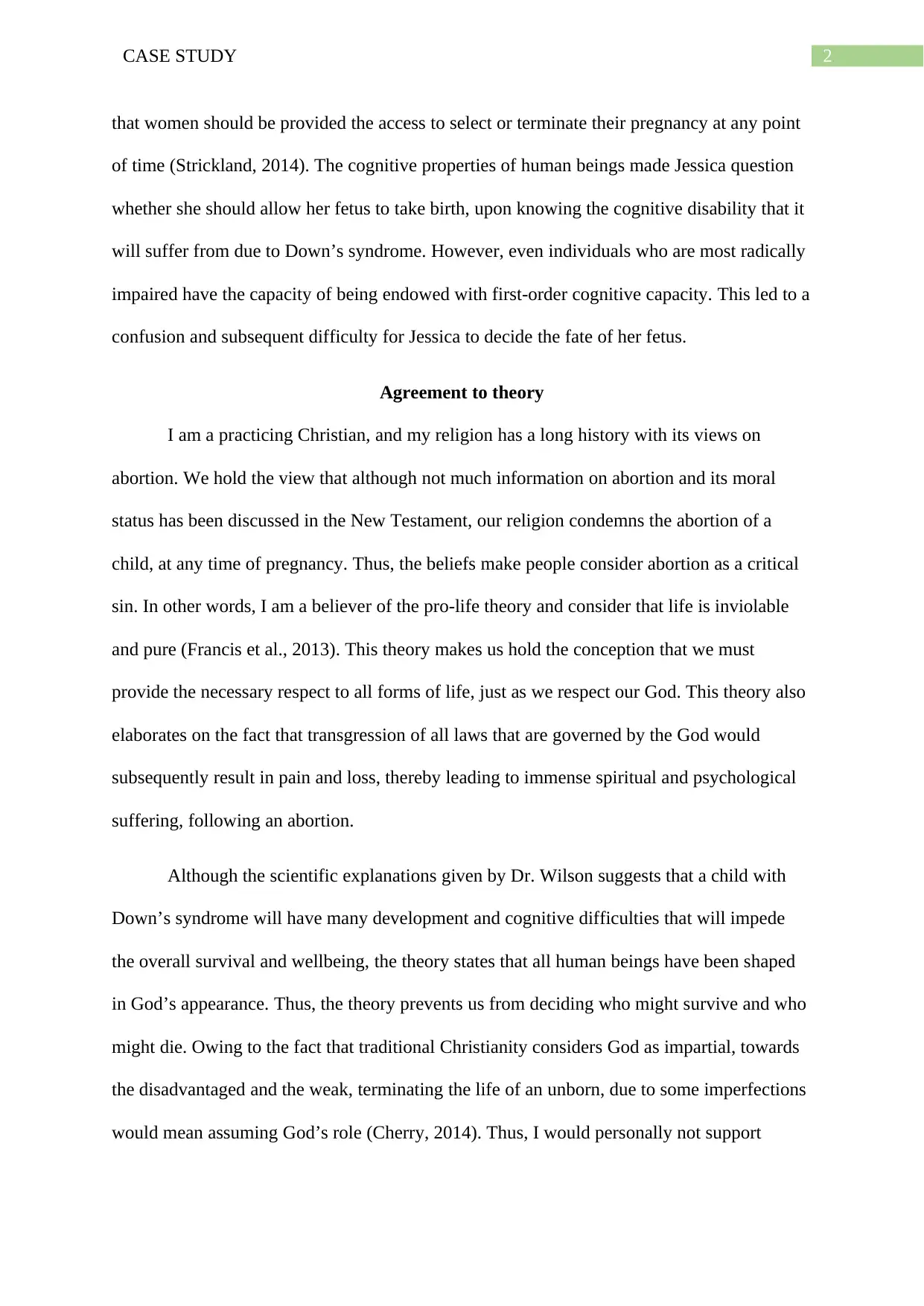
2CASE STUDY
that women should be provided the access to select or terminate their pregnancy at any point
of time (Strickland, 2014). The cognitive properties of human beings made Jessica question
whether she should allow her fetus to take birth, upon knowing the cognitive disability that it
will suffer from due to Down’s syndrome. However, even individuals who are most radically
impaired have the capacity of being endowed with first-order cognitive capacity. This led to a
confusion and subsequent difficulty for Jessica to decide the fate of her fetus.
Agreement to theory
I am a practicing Christian, and my religion has a long history with its views on
abortion. We hold the view that although not much information on abortion and its moral
status has been discussed in the New Testament, our religion condemns the abortion of a
child, at any time of pregnancy. Thus, the beliefs make people consider abortion as a critical
sin. In other words, I am a believer of the pro-life theory and consider that life is inviolable
and pure (Francis et al., 2013). This theory makes us hold the conception that we must
provide the necessary respect to all forms of life, just as we respect our God. This theory also
elaborates on the fact that transgression of all laws that are governed by the God would
subsequently result in pain and loss, thereby leading to immense spiritual and psychological
suffering, following an abortion.
Although the scientific explanations given by Dr. Wilson suggests that a child with
Down’s syndrome will have many development and cognitive difficulties that will impede
the overall survival and wellbeing, the theory states that all human beings have been shaped
in God’s appearance. Thus, the theory prevents us from deciding who might survive and who
might die. Owing to the fact that traditional Christianity considers God as impartial, towards
the disadvantaged and the weak, terminating the life of an unborn, due to some imperfections
would mean assuming God’s role (Cherry, 2014). Thus, I would personally not support
that women should be provided the access to select or terminate their pregnancy at any point
of time (Strickland, 2014). The cognitive properties of human beings made Jessica question
whether she should allow her fetus to take birth, upon knowing the cognitive disability that it
will suffer from due to Down’s syndrome. However, even individuals who are most radically
impaired have the capacity of being endowed with first-order cognitive capacity. This led to a
confusion and subsequent difficulty for Jessica to decide the fate of her fetus.
Agreement to theory
I am a practicing Christian, and my religion has a long history with its views on
abortion. We hold the view that although not much information on abortion and its moral
status has been discussed in the New Testament, our religion condemns the abortion of a
child, at any time of pregnancy. Thus, the beliefs make people consider abortion as a critical
sin. In other words, I am a believer of the pro-life theory and consider that life is inviolable
and pure (Francis et al., 2013). This theory makes us hold the conception that we must
provide the necessary respect to all forms of life, just as we respect our God. This theory also
elaborates on the fact that transgression of all laws that are governed by the God would
subsequently result in pain and loss, thereby leading to immense spiritual and psychological
suffering, following an abortion.
Although the scientific explanations given by Dr. Wilson suggests that a child with
Down’s syndrome will have many development and cognitive difficulties that will impede
the overall survival and wellbeing, the theory states that all human beings have been shaped
in God’s appearance. Thus, the theory prevents us from deciding who might survive and who
might die. Owing to the fact that traditional Christianity considers God as impartial, towards
the disadvantaged and the weak, terminating the life of an unborn, due to some imperfections
would mean assuming God’s role (Cherry, 2014). Thus, I would personally not support
⊘ This is a preview!⊘
Do you want full access?
Subscribe today to unlock all pages.

Trusted by 1+ million students worldwide
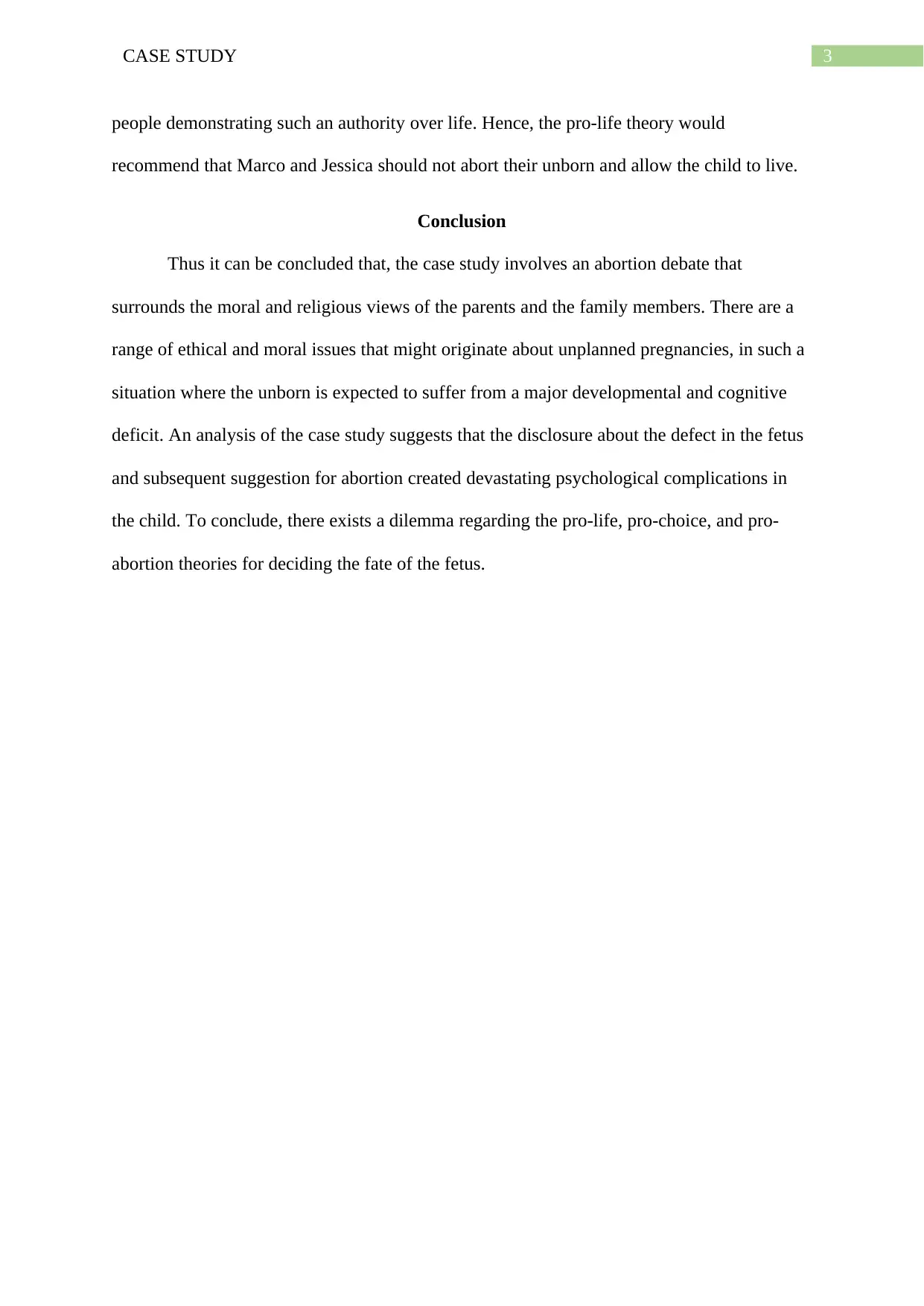
3CASE STUDY
people demonstrating such an authority over life. Hence, the pro-life theory would
recommend that Marco and Jessica should not abort their unborn and allow the child to live.
Conclusion
Thus it can be concluded that, the case study involves an abortion debate that
surrounds the moral and religious views of the parents and the family members. There are a
range of ethical and moral issues that might originate about unplanned pregnancies, in such a
situation where the unborn is expected to suffer from a major developmental and cognitive
deficit. An analysis of the case study suggests that the disclosure about the defect in the fetus
and subsequent suggestion for abortion created devastating psychological complications in
the child. To conclude, there exists a dilemma regarding the pro-life, pro-choice, and pro-
abortion theories for deciding the fate of the fetus.
people demonstrating such an authority over life. Hence, the pro-life theory would
recommend that Marco and Jessica should not abort their unborn and allow the child to live.
Conclusion
Thus it can be concluded that, the case study involves an abortion debate that
surrounds the moral and religious views of the parents and the family members. There are a
range of ethical and moral issues that might originate about unplanned pregnancies, in such a
situation where the unborn is expected to suffer from a major developmental and cognitive
deficit. An analysis of the case study suggests that the disclosure about the defect in the fetus
and subsequent suggestion for abortion created devastating psychological complications in
the child. To conclude, there exists a dilemma regarding the pro-life, pro-choice, and pro-
abortion theories for deciding the fate of the fetus.
Paraphrase This Document
Need a fresh take? Get an instant paraphrase of this document with our AI Paraphraser
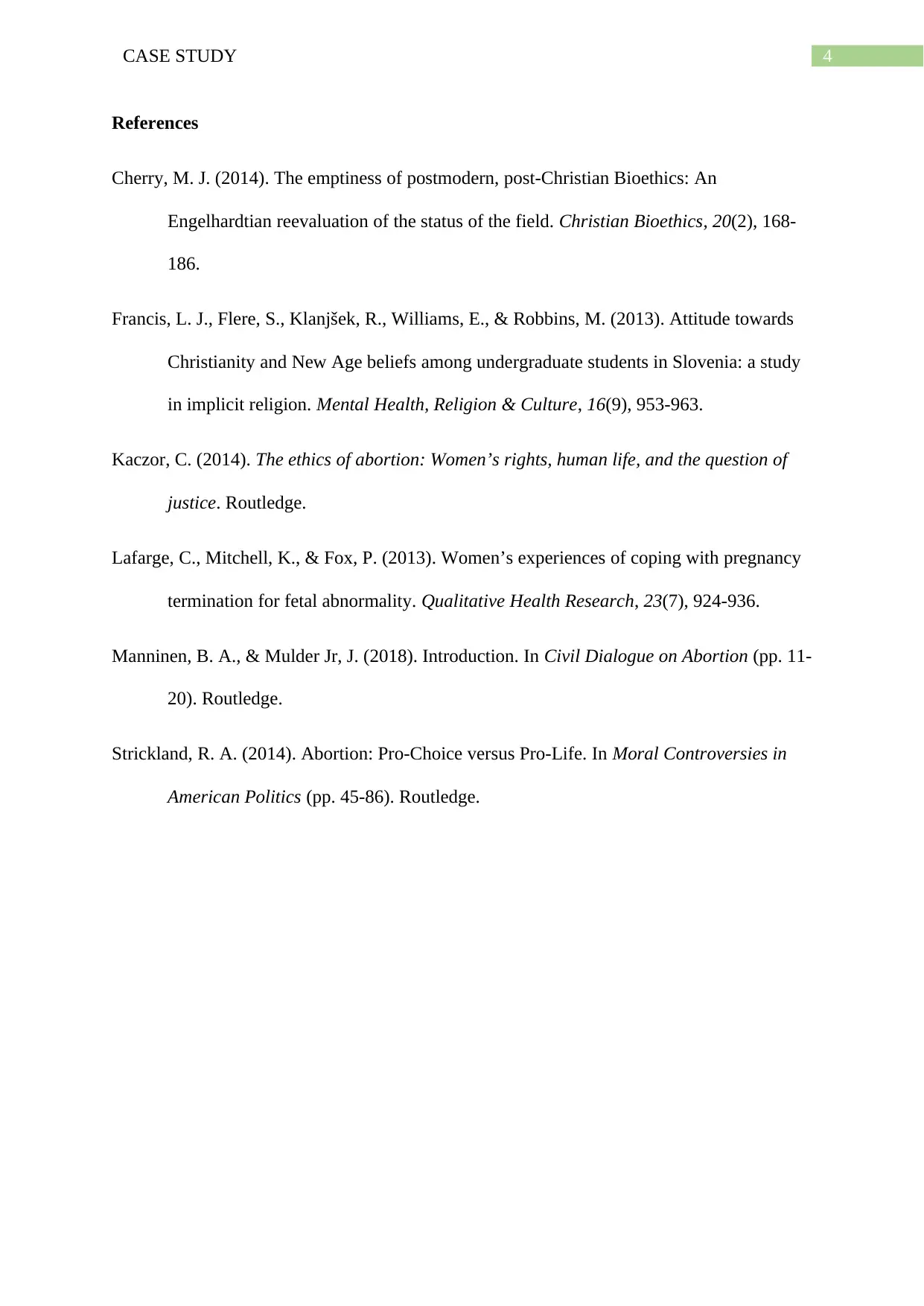
4CASE STUDY
References
Cherry, M. J. (2014). The emptiness of postmodern, post-Christian Bioethics: An
Engelhardtian reevaluation of the status of the field. Christian Bioethics, 20(2), 168-
186.
Francis, L. J., Flere, S., Klanjšek, R., Williams, E., & Robbins, M. (2013). Attitude towards
Christianity and New Age beliefs among undergraduate students in Slovenia: a study
in implicit religion. Mental Health, Religion & Culture, 16(9), 953-963.
Kaczor, C. (2014). The ethics of abortion: Women’s rights, human life, and the question of
justice. Routledge.
Lafarge, C., Mitchell, K., & Fox, P. (2013). Women’s experiences of coping with pregnancy
termination for fetal abnormality. Qualitative Health Research, 23(7), 924-936.
Manninen, B. A., & Mulder Jr, J. (2018). Introduction. In Civil Dialogue on Abortion (pp. 11-
20). Routledge.
Strickland, R. A. (2014). Abortion: Pro-Choice versus Pro-Life. In Moral Controversies in
American Politics (pp. 45-86). Routledge.
References
Cherry, M. J. (2014). The emptiness of postmodern, post-Christian Bioethics: An
Engelhardtian reevaluation of the status of the field. Christian Bioethics, 20(2), 168-
186.
Francis, L. J., Flere, S., Klanjšek, R., Williams, E., & Robbins, M. (2013). Attitude towards
Christianity and New Age beliefs among undergraduate students in Slovenia: a study
in implicit religion. Mental Health, Religion & Culture, 16(9), 953-963.
Kaczor, C. (2014). The ethics of abortion: Women’s rights, human life, and the question of
justice. Routledge.
Lafarge, C., Mitchell, K., & Fox, P. (2013). Women’s experiences of coping with pregnancy
termination for fetal abnormality. Qualitative Health Research, 23(7), 924-936.
Manninen, B. A., & Mulder Jr, J. (2018). Introduction. In Civil Dialogue on Abortion (pp. 11-
20). Routledge.
Strickland, R. A. (2014). Abortion: Pro-Choice versus Pro-Life. In Moral Controversies in
American Politics (pp. 45-86). Routledge.
1 out of 5
Related Documents
Your All-in-One AI-Powered Toolkit for Academic Success.
+13062052269
info@desklib.com
Available 24*7 on WhatsApp / Email
![[object Object]](/_next/static/media/star-bottom.7253800d.svg)
Unlock your academic potential
Copyright © 2020–2026 A2Z Services. All Rights Reserved. Developed and managed by ZUCOL.





